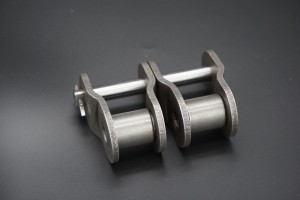Short pitch roller chains are an important component in a variety of industrial applications, including conveyors, automotive systems and agricultural machinery. These chains are designed to transmit mechanical power efficiently and reliably, making them a critical part of many manufacturing and production processes. In this article, we will explore the production technology of short-pitch roller chains, their applications and the key factors that influence their performance and durability.
Short pitch roller chain production technology
The production of short pitch roller chains involves several key manufacturing processes that are critical to ensuring the quality and performance of the final product. These processes include material selection, precision machining, heat treatment and assembly.
Material selection: The production of high-quality short pitch roller chains starts with the careful selection of raw materials. Typically, these chains are made from alloy steel, which offers excellent strength, wear resistance, and fatigue properties. The steel undergoes rigorous testing and quality control measures to ensure it meets the specifications required for chain production.
Precision machining: Once the raw material is selected, it is precision machined to create the various components of the chain, including inner and outer link plates, rollers, pins and bushings. Advanced machining techniques such as CNC milling and turning are used to achieve the tight tolerances and smooth surface finish required for optimal chain performance.
Heat treatment: Heat treatment is a critical step in the production of short pitch roller chains as it significantly affects the mechanical properties of the steel. Through carburizing, quenching, tempering and other processes, the chain components are hardened to improve their wear resistance, fatigue strength and overall durability. Precise control of heat treatment parameters is crucial to achieve the required material properties and ensure uniformity throughout the chain.
Assembly: The final stage of production is the assembly of individual chain components into a complete functional unit. This process requires careful attention to detail to ensure the chain meets specified size, clearance and performance requirements. Proper lubrication and sealing are also critical to minimizing friction and wear during operation.
Applications of short pitch roller chains
Short pitch roller chains are widely used in a variety of industrial applications due to their reliability, versatility and ability to transmit power efficiently. Some common applications include:
Conveyors: Short-pitch roller chains are widely used in conveyor systems for material handling in manufacturing, food processing, logistics and other industries. They provide a reliable way to move products along production lines and distribution centers.
Automotive Systems: In the automotive industry, short-pitch roller chains are used in a variety of applications, including engine timing systems, transmission mechanisms, and powertrain components. Their high tensile strength and fatigue resistance make them ideally suited for harsh automotive environments.
Agricultural machinery: Short-pitch roller chains play a vital role in agricultural equipment such as harvesters, tractors, and crop processing machinery. They are used to drive components such as sprockets, pulleys and conveyors, allowing agricultural equipment to operate efficiently.
Industrial machinery: From printing presses to packaging machines, short-pitch roller chains are an integral part of the operation of various industrial machinery. Their ability to transmit power over long distances under heavy loads makes them indispensable in many manufacturing processes.
Key Factors for Performance and Durability
Several key factors affecting the performance and durability of short pitch roller chains include:
Lubrication: Proper lubrication is essential to reduce friction, wear and corrosion within the chain. Regular maintenance and the use of high-quality lubricants are essential to maximize the life of your chain.
Alignment and Tensioning: Proper chain alignment and tensioning are critical to preventing premature wear and fatigue. Misalignment and excessive slack can cause uneven loading of chain components and accelerate wear.
Environmental conditions: The operating environment, including factors such as temperature, humidity, and exposure to contaminants, will affect the performance and life of the chain. Selecting the appropriate chain design and materials for specific operating conditions is critical to ensuring optimal performance.
Quality control: Strict quality control measures throughout the production process, including material testing, dimensional inspection and performance testing, are crucial to ensuring the reliability and consistency of the chain.
In summary, the production technology of short-pitch roller chains involves a combination of advanced manufacturing processes aimed at achieving high precision, durability and performance. These chains play a vital role in a wide range of industrial applications, and their reliable operation is critical to the efficiency and productivity of various industries. By understanding the key factors that influence its performance and durability, manufacturers and end users can ensure short pitch roller chains are used optimally in their respective applications.
Post time: Sep-11-2024

